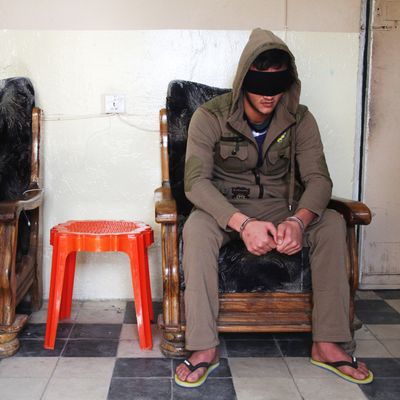
A blindfolded, handcuffed youth in a brown hoodie shuffles into the warden’s office at a prison in Kirkuk, Iraq, and sits in a tattered chair. The prisoner, Yasser, is slim and dark-skinned, with wispy facial hair. He’s only 19 years old, but Yasser is a member of the Islamic State.
Until recently, he worked as a weapons smuggler, driver, and personal assistant to Khalil Ahmad Ali al-Wais, a.k.a. Abu Wadhah, the ISIS emir in charge of territory the group holds near Kirkuk. When a U.S. coalition airstrike killed Abu Wadhah earlier last month, Yasser was left without a protector, so he tried to flee ISIS. The peshmerga, the Kurdish fighting force in northern Iraq, received intelligence on his movements and arrested him upon his arrival in Kirkuk.
“The Islamic State says America is our enemy and a country of unbelievers,” Yasser says, in a pubescent-sounding voice, when asked about ISIS’s position on Donald Trump becoming president. “Since they first came, they said that their philosophy is to trigger a big conflict between Muslims and America. An American president who goes on television and says he hates Muslims is a good thing for ISIS. They are using this to tell people, ‘Look, the Americans hate Muslims, you must go fight and kill them.’”
The war against ISIS in Iraq received a significant amount of debate during the American presidential race, though Donald Trump and Hillary Clinton spoke about the conflict in notably different terms. Although Clinton expressed her intention to step up an American military presence in the region, she stopped short of advocating for a ground invasion. Her approach, if a bit more hawkish, seemed to largely line up with Barack Obama’s slow-burn strategy to “degrade and ultimately destroy” the brutal Sunni militant group. Today, with Obama’s strategy still in place for the moment even though he is out of office, U.S.-supported forces continue to fight to free Mosul, the last major Iraqi city under ISIS control. It has been a slow, steady, and quiet plan; one that has succeeded in shrinking ISIS’s footprint without alienating any of the key players in Iraq — including the Iraqi army, the Shia militias that fight alongside government troops, and the peshmerga in the north — or turning them against each other.
As for Trump, it’s difficult to divine a coherent Iraq strategy based on statements he made during his campaign and first few days in office, but all indications are that it will involve bringing a lot more drama to a country that’s always on the precipice of mass sectarian violence. He has advocated for the deployment of up to 30,000 troops in Iraq and discussed at length his objectively absurd plan to take Iraq’s oil as “reimbursement” for American military efforts — a thought he reiterated as president during his freewheeling speech at CIA headquarters last weekend and again in his interview Wednesday with ABC’s David Muir. Trump told Muir that critics who questioned the legality of the move were “fools,” and said: “If we took the oil, you wouldn’t have ISIS.” Trump has also roundly criticized Obama’s strategy in the ongoing battle for Mosul, saying that the U.S. should not have abandoned the element of surprise by publicly announcing the offensive months ahead of time (though military strategists tend to see it as irrelevant to the progress of the battle). In his first press briefing on Monday, White House spokesman Sean Spicer reiterated that Trump will not reveal his military plans for Iraq before undertaking them.
So as we enter the Trump administration, any expectations that his bellicose campaign rhetoric about Iraq and ISIS were just bluster seem to be unfounded. In his inaugural speech, Trump spoke of eradicating “radical Islamic terrorism from the face of the earth,” and creating a plan of attack against ISIS is reportedly among his highest priorities in the coming weeks. The early indications suggest the plan will be aggressive — on James Mattis’s first day as secretary of Defense, the U.S. bombed ISIS no fewer than 31 times.
The current political and military situation in Iraq is dizzyingly complex and unfamiliar to most Americans, as is the environment that Trump would be sending those 30,000 hypothetical U.S. soldiers into as part of a mission to “eradicate” ISIS and seize the oil wells under their control (zero, for the record). In an effort to get a better grasp of how the new administration’s actions might affect Iraq and the various players in the ongoing, low-grade civil war there, I traveled to northern Iraq last month to speak with fighters on all sides. Some were enthusiastic about Trump’s aggressive stance, hoping it would lead to further American involvement in the country. Others were wary of another U.S. invasion and the chaos it might trigger. Based on what Yasser told me, ISIS straddles those two positions: enthusiastic about the new American president precisely because they expect Trump to amplify the violence and bloodshed in Iraq and beyond.
The Iraqi Army and Pro-American Militias
At a military base in the town of Makhmur, 30 miles southwest of the Kurdish capital of Erbil, members of a mixed-sect group of militias under the auspices of the Iraqi government are practicing their drills under the hard-eyed gazes of several U.S. special-forces soldiers. The militia members march ostentatiously as thunderous patriotic music blares from speakers across the grounds. They are chaotically out of step, arms flailing as they march — which would be funny if these young men weren’t headed into battle soon.
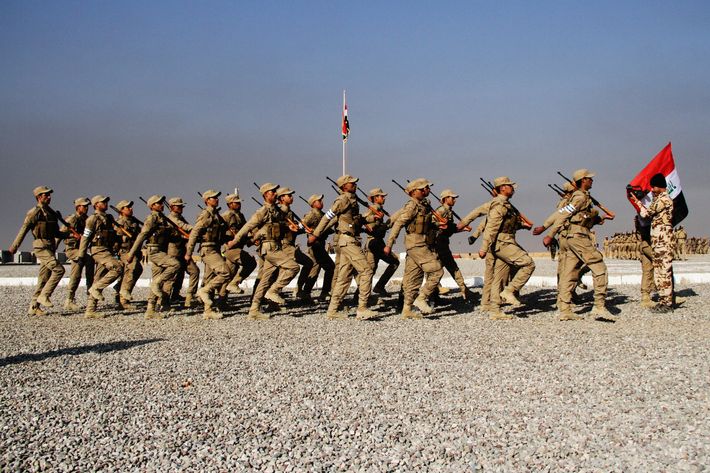
The Nineveh troops are part of a broad group of mostly Shia militias known as the Popular Mobilization Units, or PMUs, which have been causing ulcers in Washington because of their close ties to Iran as well as reports that they’ve been engaging in sectarian violence against Sunnis fleeing liberated ISIS territory. All the PMUs were recently absorbed into the Iraqi military. While some groups, like the Nineveh militias, began training with American forces, the U.S. has refused to provide strictly Shia PMUs with air support, since any coordination with Iran-backed groups would trigger enormous political controversy.
According to their leaders and Iraqi army officials overseeing the ceremony, the groups marching today are mixed Sunni, Shia, Christian, and even some Yazidis, the northern ethnic group that was devastated when ISIS spilled into Iraq in 2014. These fighters don’t exude the kind of iron discipline displayed by most Iranian-trained military forces, and the American officers appear increasingly horrified at the Nineveh group’s fumbling during the drills.
But their reaction is not shared by Karim Shwaily, the commander of the Nineveh Hashd al-Shaabi militias. In his office the day after the ceremony, Shwaily is enthusiastic about the coordination with U.S. special forces. “I think the operation is going positively,” he says. “God willing, we will soon take the eastern part of Mosul and all of the city will be under the control of Iraq.”
Asked how he anticipates U.S. strategy in Iraq will change now that Trump is president, Shwaily seems extremely reluctant to offer his thoughts.
“We are just fighters,” he says sharply. “We don’t know anything about American politics or the strategies of U.S. presidents. Our mission is clear: to fight for Nineveh and for Iraq. But America will not invade Iraq again. There have been diplomatic agreements made and they have to abide by them … on the other hand, it would be impossible to abandon Iraq at such a crucial point in the fight against Daesh” — as ISIS is known in the region. “But I think Trump’s talk of invading is just rhetoric.”
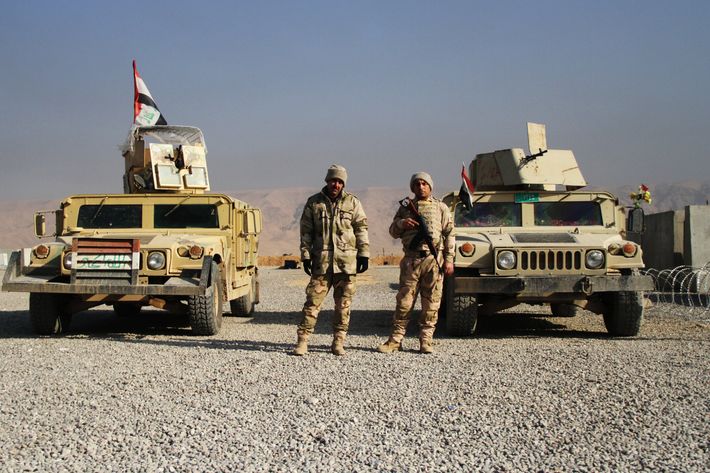
Like the Nineveh Hashd al-Shaabi, it’s not quite clear where the Iraqi army officially stands on Trump, but they’re reportedly quite displeased after his last reference to taking their oil as reimbursement for American military efforts. Though the military may have initially welcomed an American invasion to rid Iraq of ISIS, they seem to be catching on to the fact that this invasion would not be like the others, because it would be led by Donald Trump. A strong American effort to fight ISIS is one thing; a lengthy occupation for the purposes of exploiting Iraq’s natural resources is another. But for the moment, the Iraqi army seems to be caught in limbo, waiting to see how this president will treat their vulnerable, war-ravaged country.
Shwaily’s (perhaps misplaced) optimism and caution about saying anything that might provoke the new administration is shared by an Iraqi army general at the ceremony. “Coalition forces have been here for seven days,” he says. “We have two active operations with the Americans: liberating Mosul and now we are preparing for the second operation, which is to train these fighters. There are other bases like this, where U.S. Special Forces are training them and another thousand trainees coming up. The Americans are very helpful in coordinating with us, and we don’t see that changing now that the election is over.”
But an invasion is not their only concern. Trump has been crystal clear that he’s not interested in spending American treasure rebuilding or remaking foreign countries. Setting aside the question of immediate military actions, there’s also the issue of ongoing support for the fragile regime now in power in Iraq. “Another scenario is this:” says retired Lieutenant General Mark Hertling, an Iraq war veteran and military analyst. “Mr. Trump has indicated that he’s willing to be more isolationist … If Iraq does succeed soon in Mosul, and it is now time for them to shift toward their own nation-building and we don’t provide strategic support, somebody else will …We have to [help] rebuild their country under a good central government in Baghdad. If we leave that as a vacuum, it will just fall apart all over again like it’s done so many times already.”
The Kurds
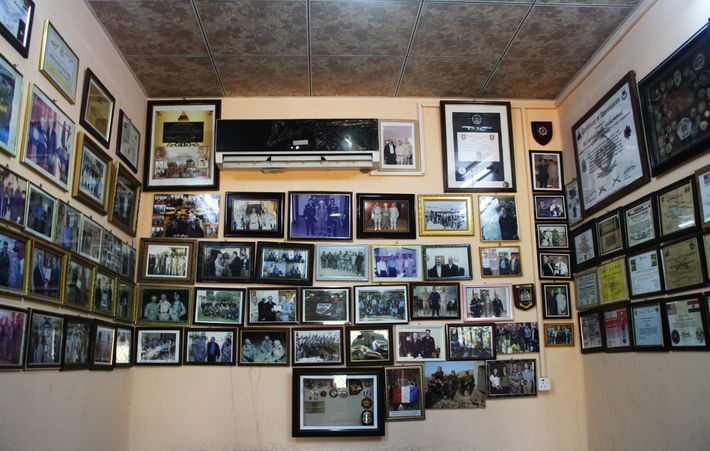
Awards from the United States government and military decorate nearly every inch of wall space in the office of Sarhad Qader Mohammad, brigadier general in the Kirkuk police force, a law-enforcement wing of the Kurdistan Regional Government. The general is hearty and mustachioed, brimming with praise for America. While Kurdistan is not quite an independent country, it has been functioning as one since the American-led invasion of Iraq in 2003. There is no small amount of hope in the region that Trump, with his incautious, no-holds-barred stance on Iraq, will allow Kurdistan to fully separate into a sovereign nation — a centuries-old dream of the Kurdish people, but one that would create massive geopolitical problems in the region and that is staunchly opposed by U.S. ally Turkey.
“The Americans know how strategically important and sensitive Kirkuk is, so we trust them to help us keep it safe in the future,” Mohammad says. “Many American soldiers were killed fighting for Kirkuk, and we are thankful for their sacrifice. The U.S. gives us much aid, including training and infrastructure; if I were to spend all day talking about what they’ve done for us, I wouldn’t be able to finish.”
Asked if he anticipates that U.S. policy will change under Trump, he smiles confidently.
“I think Trump will have to live up to what he told his people,” Mohammad says. “Obama’s strategy was to stay distant from the fight, but America was the first one hurt in the war with terrorists during 9/11. We will see what Trump’s strategy is, but America is responsible for the safety of the world, and an invasion would help the Kurds, because the peshmerga was the first army fighting Daesh with the Americans.”
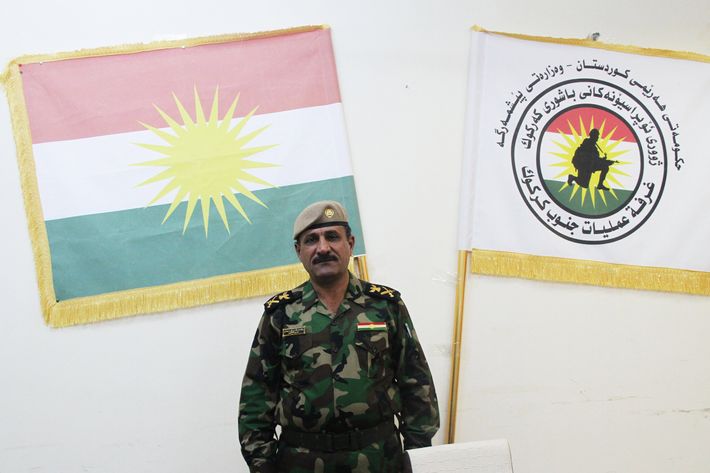
Trump has been quite vocal in his approval of the Kurds. “I am a big fan of the Kurdish forces,” he pronounced last summer, indicating that he wanted to get Kurdish leaders in a room with Turkish leaders for some negotiations — quite a tall order for anyone who understands the depth of that enmity. In any case, it seems the peshmerga are betting that a hawkish Trump administration will be generous enough to grant them independence after the dust settles in the wake of a potential large-scale American ground offensive.
The elderly warden at Yasser’s prison shares this perspective. “I think the entire American strategy is going to change,” he croaks gleefully. “In my opinion, Trump is better than Hillary Clinton because he likes the Kurds. He will be better for the peshmerga, especially if he invades. Both he and Hillary said they will support us, but Trump will be stronger.”
But while it might create a great photo op or tweet, the long-term implications of any such “generous” gesture from Trump could be very serious. The question of Kurdish independence “will be another source of friction once the war calms down and Kurds and Iraqi Arabs no longer have a common enemy,” says Dr. Jeffrey McCausland, a veteran and professor at the Strategic Studies Institute, U.S. Army War College. Of course, nothing Trump has said so far indicates any plan, much less awareness, of how he’ll prevent the region from tumbling deeper into chaos after the extremists are “eradicated” and the oil is “taken.”
Iran-Backed Militias
In October 2016, ISIS militants set fire to the Qayyarah oil fields, about 35 miles south of Mosul. The inferno has been blazing ever since, with little hope of being extinguished anytime soon, and the village itself exists under a noxious, billowing cloud of dark smoke. At an intersection on the outskirts of town, a charity van pulls up to a mob of filthy children in rags and workers get out and begin distributing food. The children immediately begin to fight over the fruit and bread. A little girl no older than 6 or 7, wearing a shredded pink Minnie Mouse shirt, punches an older boy in the stomach and triumphantly makes off with an orange.
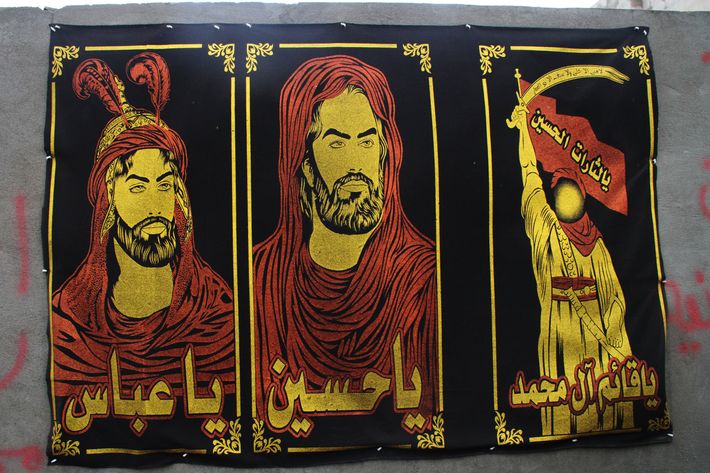
A short distance away, at an outpost of the Badr Organization, one of the Iran-linked Shia Hashd al-Shaabi militias that have proven so politically sensitive for the U.S., two fighters sip from little glasses of syrupy black tea. The Badr Organization was born during the 1980s and led uprisings against Saddam Hussein during the 2003 Iraq war. In the aftermath of Saddam’s ouster, the militia has grown in size and influence, with the help of Iran. The Badr Organization now claims to command between 10,000 and 50,000 men. The group was implicated in reports of sectarian war crimes following the liberation of Fallujah in 2016, though they deny responsibility.
It’s clear that the Shia militiamen are significantly more apprehensive about a Trump presidency than their peers in the Nineveh Hashd al-Shaabi, Iraqi army, and peshmerga. Given Trump’s aggressive rhetoric on Iran, their wariness is understandable.
“Obama is weak and wasn’t hard on the terrorists,” says one of them, a thickly bearded man wearing a green beanie. “We heard that this president will be stronger, so we know everything will change. But we also know he doesn’t distinguish between Daesh and us. He thinks we’re terrorists because we’re supposed to be on the side of Iran.”
“The oil wells here are decrepit and damaged,” his tall, thin friend adds. “I have heard that this President Trump wants to come, rebuild the oil refineries and take our oil. He also says he will fight Iran and Saudi Arabia. In my opinion, one man cannot do something like that, because he will be responsible for destroying the world.”
The fighter in the green beanie lights a thin Iraqi cigarette and finishes his tea. “The peshmerga and the Iraqi army like Trump because they know they will benefit from an invasion,” he says, flicking ash into his empty glass. “But we know if there’s an invasion, we’re not going to benefit. We will end up in a conflict with America.”
It’s obvious that the Trump administration will be facing some complicated obstacles in Iraq over the upcoming months and years. McCausland of the U.S. Army War College says that the real challenge begins after ISIS is defeated: ensuring that history doesn’t repeat itself, that the country doesn’t spiral into another sectarian conflict, perhaps leading to the establishment of ISIS 2.0. “Defining success as beating ISIS, which seems to be a focal point of the Trump administration and a lot of the folks he’s picked for national security offices, isn’t good enough,” he says. “Can he in any way improve what has been the real problem in Iraq, which is continued friction between the Shiites and the Sunnis, in the aftermath of the ISIS occupation?”
According to Yasser, Trump is one bright spot in what is an otherwise bleak and besieged existence for ISIS at this moment. The 19-year-old shuffles his feet around and fidgets with his handcuffs, looking like a restless kid in math class as he tries to explain the terrorist group’s enthusiasm for the new U.S. president.
“A president like Trump will drive Muslims towards the Islamic State and show them that all the kuffar” — the unbelievers — “hate them,” Yasir says without expression. “It makes the Islamic State happy to use him to manipulate the people who want to fight for Islam.”





























